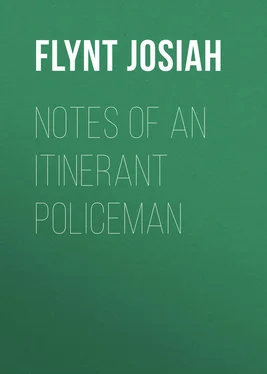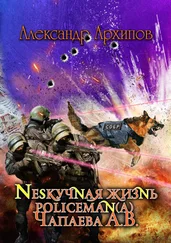Josiah Flynt - Notes of an Itinerant Policeman
Здесь есть возможность читать онлайн «Josiah Flynt - Notes of an Itinerant Policeman» — ознакомительный отрывок электронной книги совершенно бесплатно, а после прочтения отрывка купить полную версию. В некоторых случаях можно слушать аудио, скачать через торрент в формате fb2 и присутствует краткое содержание. Жанр: foreign_antique, foreign_prose, на английском языке. Описание произведения, (предисловие) а так же отзывы посетителей доступны на портале библиотеки ЛибКат.
- Название:Notes of an Itinerant Policeman
- Автор:
- Жанр:
- Год:неизвестен
- ISBN:нет данных
- Рейтинг книги:4 / 5. Голосов: 1
-
Избранное:Добавить в избранное
- Отзывы:
-
Ваша оценка:
- 80
- 1
- 2
- 3
- 4
- 5
Notes of an Itinerant Policeman: краткое содержание, описание и аннотация
Предлагаем к чтению аннотацию, описание, краткое содержание или предисловие (зависит от того, что написал сам автор книги «Notes of an Itinerant Policeman»). Если вы не нашли необходимую информацию о книге — напишите в комментариях, мы постараемся отыскать её.
Notes of an Itinerant Policeman — читать онлайн ознакомительный отрывок
Ниже представлен текст книги, разбитый по страницам. Система сохранения места последней прочитанной страницы, позволяет с удобством читать онлайн бесплатно книгу «Notes of an Itinerant Policeman», без необходимости каждый раз заново искать на чём Вы остановились. Поставьте закладку, и сможете в любой момент перейти на страницу, на которой закончили чтение.
Интервал:
Закладка:
CHAPTER II
THE PROFESSIONAL CRIMINAL
In appearance and manner the professional criminal has not changed much in the last decade. I knew him first over ten years ago, when making my earliest studies of tramp life. I saw him again five years ago, while on a short trip in Hoboland, and we have met recently on the railroads; and he looks just about as he did when we first got acquainted.
Ordinarily he would not be noticed in mixed company by others than those accustomed to his ways. He is not like the tramp, whom practically any one can pick out in a crowd. He dresses well, can often carry himself like a gentleman, and generally has a snug sum of money in his pockets. It is his face, voice, and habits of companionship that mark him for what he is. Not that there is necessarily that in his countenance which Lombroso would have us believe signifies that he is a degenerate, congenitally deformed or insane, but rather that the life he leads gives him a look which the trained observer knows as "the mug of a crook." He can no more change this look after reaching manhood than can a genuinely honest man, who has never been in prison, acquire it. I had learned to know it, and had become practised in discovering it, long before I became a policeman. It took me years to reach the stage when in merely looking hurriedly at a criminal something instinctively pronounced him a thief, but such a time certainly comes to him who sojourns much in criminal environment. There are, of course, certain special features and wrinkles that one looks for, and that help in the general summing up, but after awhile these are not thought of in judging a man, at least not consciously, and the observer bases his opinion on instinctive feeling. Given the stylish clothes to which I have referred, a hard face, suspicious eyes which seem to take in everything, a loitering walk, a peculiar guttural cough, given by way of signal, and called the thief's cough, and a habit of lingering about places where a "sporty" constituency is usually to be found, and there is pretty conclusive evidence that a professional thief is in view. All of this evidence is not always at hand; sometimes there is only the cough to go by, but, the circumstances being suspicious, any one of them is sufficient to make an expert observer look quickly and prick up his ears.
In New York City, for instance, there are streets in which professional thieves can be met by the dozen, if one understands how to identify them, and it is only necessary to pass a few words and they can be drawn into conversation. Some are dressed better than others, – there are a great many ups and downs in the profession, – and some look less typical than the more experienced men, – it takes time for the life to leave its traces, – but there they stand, the young and old, the clever and the stupid, for any one who knows how to scrape acquaintance with them. They are the most difficult people in the world to learn to know well until one has mastered their freemasonry, and then they are but little more fearful of approach than is the tramp.
I devote a special chapter to their class, because I believe that they are the least understood of all offenders, and also, as I stated in the last chapter, because I consider them the real crux of the problem of crime in this country. The petty offender is comparatively easy to discourage, the backwoods criminal will disappear as our country develops, the born criminal, the man who says that he cannot help committing crimes, can be shut up indefinitely, but the professional criminal, thanks to his own cleverness and the league he and the unknown thief have entered into, baffles both the criminologist and the penologist, and he probably does more financial harm to the country than all the other offenders put together. He is the man that we must apprehend and punish before crime in the United States will fail to be attractive, and at the present moment it is its attractiveness which helps to make our criminal statistics so alarming.
I have placed him fourth in numerical strength in my general classification, and I believe this to be a correct estimate of the number of those who really make their living by professional thieving. If those are to be included who would like to succeed as professional thieves and fail, and drop down sooner or later into the occasional criminal's class, or into the tramp's class, the position I have given the so-called successful "professional" would have to be changed; but it has seemed best to confine the class to those who are rated successful, and on this basis I doubt whether an actual census taking, if it were possible, would prove them to be more numerous than I have indicated. Seeing and hearing so much of them on my travels, I made every effort to secure trustworthy statistics in regard to their number, and as the majority of them are known to the police, it seemed reasonable to suppose that, if I passed around enough among different police organisations, I ought to get satisfactory figures, but the fact of the matter is that the police themselves can only make guesses concerning the general situation, and I am unable to do any better.
When putting queries concerning the number of the offenders in question, my informants wanted me to differentiate and ask them about particular kinds of professionals before they would reply. One very well informed detective, for instance, said: "Do you mean the whole push, or just the A Number One guns? If you mean the push, why you're safe in saying that there are 100,000 in the whole country, but the most of 'em are a pretty poor lot. If you mean the really good people, 10,000 will take 'em all in."
The cities which were reported to have turned out the greatest number were New York, Chicago, Boston, Philadelphia, Pittsburg, Buffalo, Detroit, Cleveland, Cincinnati, St. Louis, and San Francisco. Chicago was given the palm for being, at the present moment, the main stronghold of habitual criminals. Nearly every photograph I saw of a young offender was said to represent one of Chicago's hopefuls, and the pictures of the old men were generally described as the likenesses of New York City "talent." Chicago's lead in the number of "professionals" was explained by one man on the ground that it is a Mecca and Medina "for young fellows who have got into some scrape in the East. They go to Chicago, get in with the push, and then start out on the road. The older men train them."
A question that I was continually putting to myself when meeting the "professional" was: What made him choose such a career? He is intelligent, agreeable to talk to, pleasant as a travelling companion, and among his kind a fairly good fellow, and why did he not put these abilities and talents to a better use? To understand him well I believe that one must make his acquaintance while he is still living at home, as a boy, in some city "slum." He does not always come from a slum, but, as a rule, this is where he begins his criminal career. In every quarter of this character there is a criminal atmosphere. The criminologists have not given this fact sufficient prominence in their writings. They make some mention of it, but it is seldom given its true significance in their books. The best-born lad in the world can go wrong if forced to live in this corrupt environment. Not that he is necessarily taught to commit crimes, or urged to, although this sometimes happens; they become spontaneous actions on his part. The very air he breathes frequently incites him to criminal deeds, and practice makes him skilful and expert. In another environment, in nine cases out of ten, he could be trained to take an interest in upright living; in this one he follows the lines of least resistance, and becomes a thief.
Let me describe the childhood of a criminal boy who will serve as a type for thousands.
He was born in one of the slums of New York, not far from the Bowery, and within a stone's throw of the clock of Cooper Institute, and the white spire of Grace Church. From the very start he was what is called an unwelcome child. Not that there was any particular dislike toward him personally, but his parents had all they could do, and more too, to care for the half dozen other children who had come to them, and, when he appeared, there was hardly any room in the house left. He grew up with the sense of want always present, and when he got into the street with the other children of the neighbourhood, it became even more oppressive. Pretty soon he learned from the example of his playmates that begging sometimes helps to quiet a boy's hunger, and that pilfering from the grocer's sidewalk display makes the dinner at home more substantial. These are bits of slum philosophy that every child living in slums learns to appreciate sooner or later. The lad in question was no exception. He was soon initiated into the clique, and played his own part in these miniature bread riots. He did not appreciate their criminal significance. All he knew was that his stomach was empty and that he wanted the things he saw in the shops and streets. He was like a baby who sees a pretty colour gleaming on the carpet, and, without counting the cost or pains, creeps after it. He knew nothing of the law of Mine and Thine, except as the thing desired was held fast in the fist of its owner. Not that he was deformed in his moral nature, or naturally lacking in moral power, but this nature and power had never been trained. Like his body, they had been neglected and forgotten, and it is no surprise that they failed to develop. Had somebody taken him out of his "slum" environment, and taught him how to be respectable and honest, his talents might have been put to good uses, but luck, as he calls circumstances, was against him, and he had to stay in low life.
Читать дальшеИнтервал:
Закладка:
Похожие книги на «Notes of an Itinerant Policeman»
Представляем Вашему вниманию похожие книги на «Notes of an Itinerant Policeman» списком для выбора. Мы отобрали схожую по названию и смыслу литературу в надежде предоставить читателям больше вариантов отыскать новые, интересные, ещё непрочитанные произведения.
Обсуждение, отзывы о книге «Notes of an Itinerant Policeman» и просто собственные мнения читателей. Оставьте ваши комментарии, напишите, что Вы думаете о произведении, его смысле или главных героях. Укажите что конкретно понравилось, а что нет, и почему Вы так считаете.












